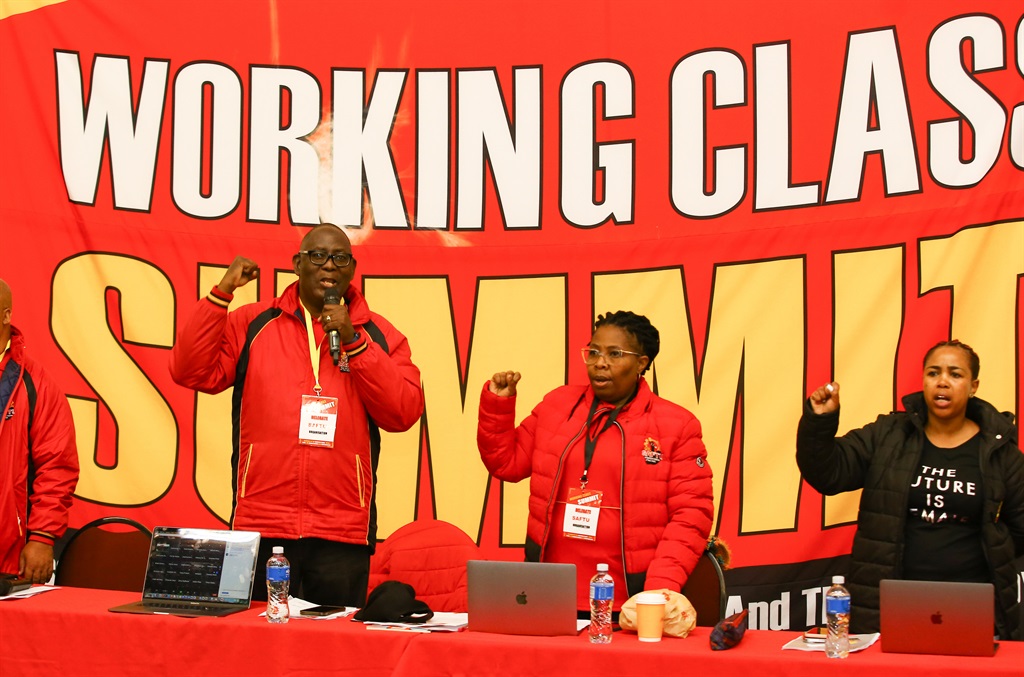The South African Federation of Trade Unions (Saftu) has announced that it will embark on a national strike across South Africa protesting against the rising costs of living, load shedding, and other economic challenges.
According to the Union, the strike will hold on August 24.
This was decided by Saftu at their Working Class Summit in Boksburg on Friday. The national shutdown will see Saftu, its union affiliates, and like-minded organisations protesting nationwide in three weeks. Saftu had an estimated 725 078 individual members in 21 affiliates unions in 2018.
Saftu president, Ruth Ntlokotse who addressed the Working Class Summit on Friday said the working class faced unprecedented economic pressures from rising costs including the inflation rate, electricity tariffs, fuel prices, and food costs.
She lamented the country’s expanded 45.6% unemployment rate – disproportionately felt among young South Africans – with two million job losses as a result of the Covid-19 pandemic.
“Due to the failed state, our people are under siege. The level of poverty and squalor produced by capitalism makes matters worse for women and children. In Kagiso we saw criminal labour systems exploiting both poor residents and foreign labourers,” said Ntlokotse.
Ntlokotse said Saftu leadership, along with the leadership of affiliates and social partners, had decided to hold a national strike at the end of the month to protest against these economic pressures.
“As a reflection of unity in struggle, we have resolved to begin planning for national mobilisation, specifically on 24 August. We are looking forward to a fruitful and robust engagement as we plan to seek ways to challenge the social ills that confront the working class, to unite our struggles, and to find more inspiring victories,” said Ntlokotse.
Ntlokotse said Saftu declared to work together with other trade union federations, unions, and organisations.
“We need unity on the ground, not just a declaration. We declared that business and government austerity, especially in the public service, will be opposed,” said Ntlokots
Princess Majola from the Assembly of The Unemployed said the expansion of grants from the South African Social Security Agency (Sassa) had become more urgent as unemployment remains stubbornly high. She said the government’s expanded public works programme (EPWP) often did not reach the poorest among South Africa’s youth.
“With plus-minus 11 million unemployed, over 40% being youth and women being forced into unpaid labour, we had to have our president tell us that government does not create jobs, but businesses do. The government is giving EPWP programmes and these do not serve the poorest,” said Majola.
The Climate Justice Coalition’s Alex Lenferna said South Africa was failing to make progress in adding renewables to the grid, despite the renewables being the cheapest form of power in several economies because the government wanted to continue facilitating corrupt non-renewable contracts.
“When we look at the depth of the corruption, we look at the criminal escalation of costs in coal contracts and we look at Medupi and Kusile. The next Medupi is coming in the form of Karpowership which [Energy] Minister [Gwede] Mantashe is trying to push for. We are one of the biggest polluters. The harm of that pollution falls on the poor and the working class,” said Lenferna.
ALSO READ: SAB withdraws its liquor sales ban case against the state
Gabriel Mabitle of #PayTheGrants said with the cost of living rising sharply for low-income households, the grassroots organisation believed that the redistribution of wealth in South Africa had to be implemented through progressive tax systems.
“As #PayTheGrants, we want a universal basic income grant and reject a means test system. The universality is critical, because without it you have to have a means test, and that is akin to asking who is more poor or being asked to prove that you are poor,” sand Mabitle.
Saftu and its social partners will hold several events in the run-up to the national strike, including a stakeout outside of the precinct of Parliament on 16 August against gender-based violence and a commemoration of the Marikana massacre at the koppie where the shooting took place on the same day.
Source: Fin24
